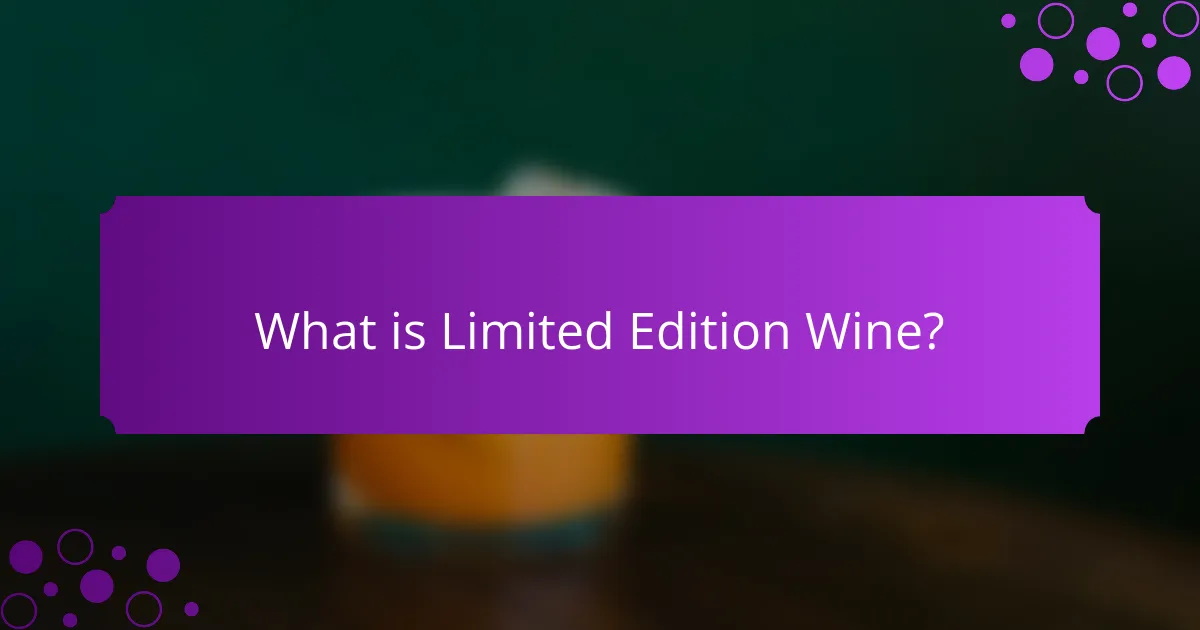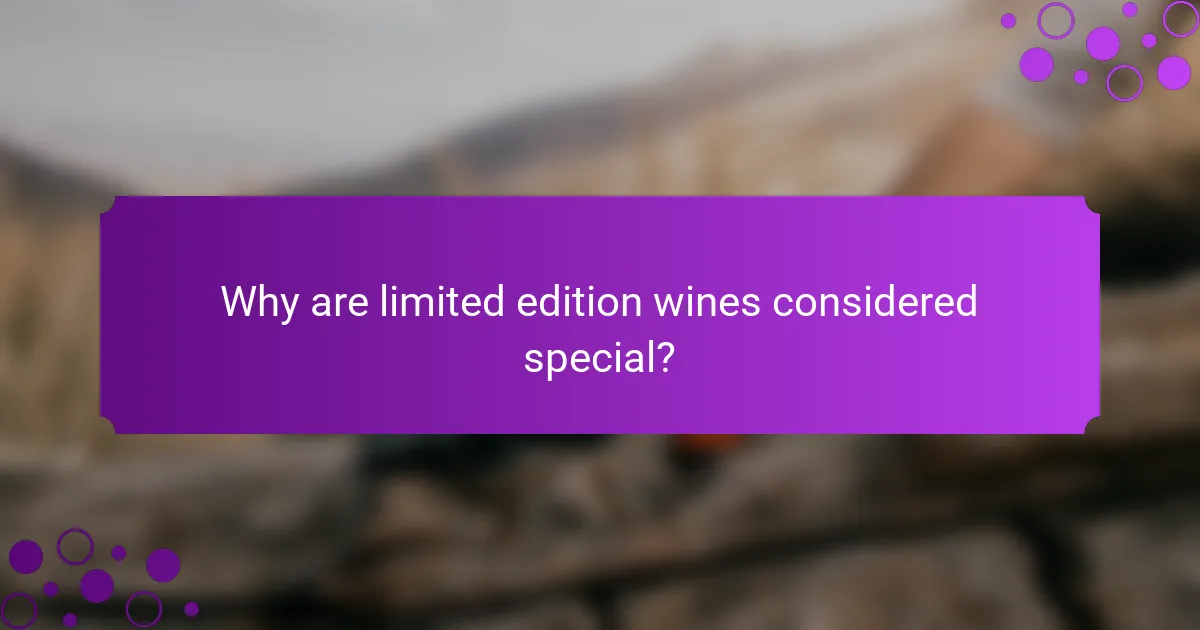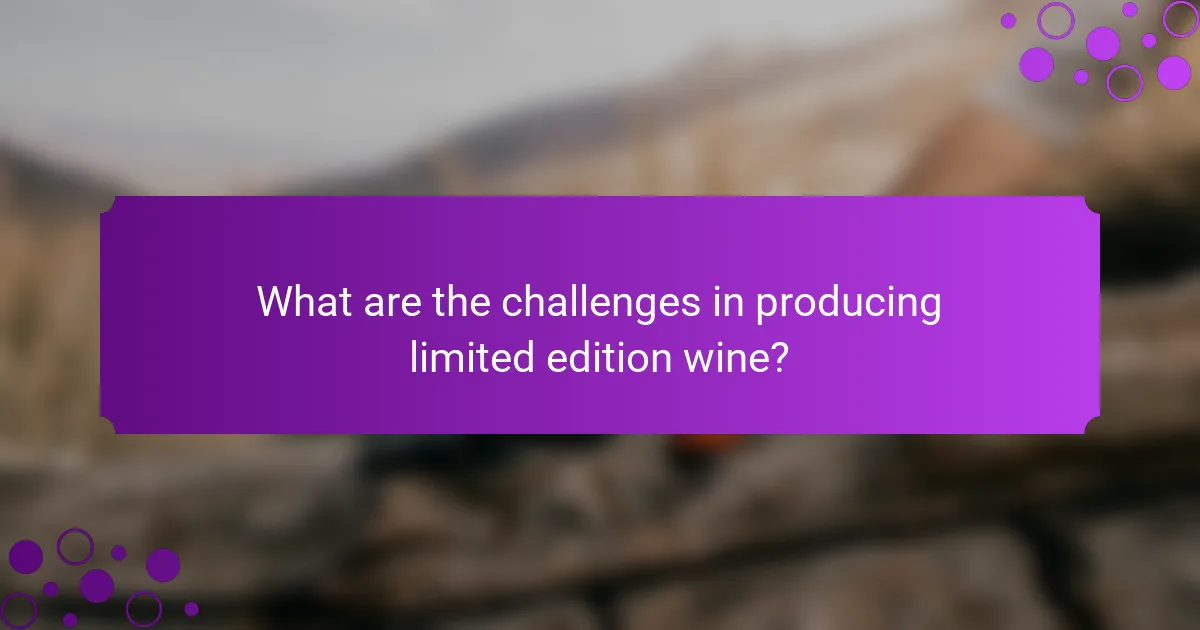
What is Limited Edition Wine?
Limited edition wine is a unique wine produced in restricted quantities. These wines are often crafted to celebrate special occasions or showcase exceptional vineyard conditions. Limited editions may feature distinctive characteristics, such as specific grape varieties or unique aging processes. They are typically released in small batches, which enhances their exclusivity. Collectors and enthusiasts often seek these wines due to their rarity. The limited nature often drives up demand and can increase the wine’s value over time. Many winemakers use limited editions to highlight innovative techniques or terroir influences. This practice allows them to express the unique qualities of their vineyard or region.
How does terroir influence the characteristics of limited edition wine?
Terroir significantly influences the characteristics of limited edition wine. Terroir encompasses the unique environmental conditions of a vineyard. These conditions include soil type, climate, and topography. Each of these factors affects grape growth and flavor development. For instance, volcanic soils can impart mineral notes to wine. Similarly, cooler climates may produce wines with higher acidity. Limited edition wines often reflect these unique terroir characteristics. They are crafted from select grapes grown in specific regions. This intentional selection enhances the wine’s uniqueness and complexity. Studies show that wines from distinct terroirs can have significantly different flavor profiles. This variation is a key selling point for limited edition wines.
What are the key terroir components that affect wine flavor?
The key terroir components that affect wine flavor include soil type, climate, topography, and grape variety. Soil type influences drainage and nutrient availability. Different soils, such as clay, limestone, and sandy soils, impart unique mineral qualities to the wine. Climate affects grape ripening and acidity levels. Warm climates tend to produce riper, fruitier wines, while cooler climates yield higher acidity and more subtle flavors. Topography, including elevation and slope, affects sunlight exposure and temperature variations. These factors combine to create a distinct environment for each vineyard. Additionally, grape variety plays a crucial role, as different grapes express terroir in unique ways. Research has shown that these components significantly impact the sensory characteristics of wine, contributing to its overall flavor profile.
How does soil type impact the quality of limited edition wine?
Soil type significantly impacts the quality of limited edition wine. Different soil types influence vine growth and grape characteristics. For instance, clay soils retain moisture, benefiting regions with low rainfall. Sandy soils provide excellent drainage and promote root development. Limestone soils contribute to acidity and minerality in grapes. These factors directly affect flavor profiles and aging potential in wine. Research shows that terroir, including soil type, is crucial for producing high-quality wines. A study published in the Journal of Wine Research highlights that specific soil compositions correlate with distinct varietal expressions.
What production techniques are used in creating limited edition wine?
Limited edition wine is often crafted using specialized production techniques to enhance its uniqueness. Techniques include hand-harvesting grapes to ensure quality. Small-batch fermentation allows for greater control over the wine’s development. Use of specific yeast strains can impart distinct flavors. Aging in premium oak barrels adds complexity and character. Minimal intervention methods preserve the wine’s terroir expression. Blending different varietals can create a signature profile. These techniques contribute to the exclusivity and appeal of limited edition wines.
How does the fermentation process differ for limited edition wines?
Limited edition wines often undergo a more controlled and unique fermentation process compared to regular wines. This process may involve smaller fermentation vessels to enhance precision. Limited editions may also utilize specific yeast strains to achieve distinct flavor profiles. Temperature control can be more meticulous, allowing for optimal extraction of aromas. The duration of fermentation may be extended for complexity. Additionally, these wines may incorporate techniques like malolactic fermentation for smoother textures. Such practices emphasize the unique terroir and elevate the wine’s character. These differences contribute to the exclusivity and quality associated with limited edition wines.
What role does aging play in the production of limited edition wine?
Aging plays a crucial role in the production of limited edition wine. It enhances the wine’s complexity and depth of flavor. During aging, chemical reactions occur that develop desirable characteristics. Tannins soften, acidity balances, and aromatic compounds evolve. This process can take place in various containers, such as oak barrels or stainless steel tanks. Limited edition wines often undergo longer aging periods to achieve unique profiles. For instance, wines aged in oak can gain vanilla and spice notes. The specific aging process is often a key selling point for collectors and connoisseurs.

Why are limited edition wines considered special?
Limited edition wines are considered special due to their scarcity and unique characteristics. These wines are produced in limited quantities, making them rare and sought after by collectors and enthusiasts. The limited production often results from specific vineyard selections or unique winemaking techniques. Additionally, these wines may showcase exceptional terroir, reflecting the distinct environmental conditions of their origin. Limited editions can also highlight innovative practices or experimental blends that are not replicated. The exclusivity and craftsmanship involved contribute to their perceived value. Collectors often view them as investment opportunities, further enhancing their allure.
What factors contribute to the exclusivity of limited edition wines?
Limited edition wines are exclusive due to several key factors. First, limited production runs create scarcity. Wineries may produce only a small number of bottles, enhancing desirability. Second, unique terroir influences the wine’s character. Specific vineyard locations yield distinct flavors and qualities. Third, exceptional winemaking techniques contribute to uniqueness. These methods often involve traditional practices or innovative approaches. Fourth, historical significance can add value. Wines tied to notable events or heritage are often sought after. Fifth, packaging and branding play a role. Eye-catching labels and storytelling enhance the perceived value. Lastly, collector demand drives exclusivity. Enthusiasts seek rare wines, further increasing their market value.
How does scarcity affect the market value of limited edition wines?
Scarcity increases the market value of limited edition wines. When a wine is produced in limited quantities, it creates a sense of exclusivity. Consumers often perceive rare wines as more desirable. This heightened demand can drive up prices significantly. For example, a limited release from a prestigious vineyard can appreciate in value by over 200% within a few years. Additionally, scarcity often leads to collectors seeking these wines as investments. Historical data shows that wines with limited availability frequently outperform those that are mass-produced. Thus, scarcity directly correlates with increased market value in the limited edition wine sector.
What are the unique attributes that differentiate limited edition wines from regular wines?
Limited edition wines are distinguished by their scarcity, unique terroir, and specialized production techniques. Scarcity is a defining feature, as these wines are produced in limited quantities. Unique terroir refers to the specific environmental conditions, such as soil and climate, that influence the wine’s characteristics. Specialized production techniques may include hand-harvesting, extended aging, or specific fermentation methods. These factors contribute to the wine’s distinct flavor profile and complexity. Limited edition wines often feature unique labeling and packaging, enhancing their collectible appeal. The combination of these attributes elevates limited edition wines above regular wines in terms of quality and exclusivity.
How does consumer perception influence the demand for limited edition wines?
Consumer perception significantly influences the demand for limited edition wines. Positive perceptions of exclusivity and quality drive higher demand. Consumers often associate limited editions with superior craftsmanship and unique flavors. This perception is reinforced by marketing strategies highlighting rarity and prestige. Research shows that scarcity increases desirability, leading to higher sales. For example, a study by the Journal of Wine Economics found that limited availability can elevate consumer interest. Additionally, consumer reviews and ratings impact perceptions, further affecting demand. Overall, consumer perception shapes the market dynamics for limited edition wines.
What marketing strategies are effective for promoting limited edition wines?
Effective marketing strategies for promoting limited edition wines include exclusivity, storytelling, and targeted events. Exclusivity creates a sense of urgency and desirability. Limited releases often attract consumers who value rarity. Storytelling enhances the emotional connection between the wine and the consumer. Sharing the history and terroir of the wine adds depth to the marketing narrative. Targeted events, such as tastings or wine dinners, engage consumers directly. These events allow customers to experience the wine and meet the producers. Social media campaigns can amplify reach and engagement. Platforms like Instagram showcase the visual appeal of the wine and its packaging. Collaborations with influencers can further extend visibility. Each of these strategies leverages the unique attributes of limited edition wines to drive consumer interest and sales.
How do reviews and ratings impact consumer interest in limited edition wines?
Reviews and ratings significantly influence consumer interest in limited edition wines. Positive reviews enhance perceived value and desirability. Consumers often rely on ratings to make informed purchasing decisions. High ratings can create a sense of urgency, prompting quicker purchases. Conversely, negative reviews may deter potential buyers. Research shows that 79% of consumers trust online reviews as much as personal recommendations. In the wine market, limited editions benefit from this effect, as exclusivity paired with positive feedback drives interest. Thus, favorable reviews and ratings serve as powerful marketing tools for limited edition wines.

What are the challenges in producing limited edition wine?
Producing limited edition wine presents several challenges. One significant challenge is sourcing high-quality grapes. Limited editions often require specific grape varieties from particular vineyards. These vineyards may have limited yields, impacting availability. Another challenge is managing production costs. The meticulous process involved in crafting limited edition wines can be expensive. Additionally, maintaining consistent quality is crucial. Variability in climate and terroir can affect the final product. Furthermore, marketing limited edition wines effectively is essential. Establishing a unique brand identity can be difficult in a competitive market. Finally, regulatory compliance poses challenges. Limited edition wines must meet specific labeling and production standards.
How do climate changes affect the production of limited edition wines?
Climate changes significantly affect the production of limited edition wines. Altered temperatures influence grape ripening and acidity levels. Warmer temperatures can lead to earlier harvests. This shift may result in wines with higher alcohol content and lower acidity. Changes in precipitation patterns affect water availability for vineyards. Drier conditions can stress vines and reduce yields. Conversely, excessive rainfall may lead to disease and reduced grape quality. These factors contribute to the uniqueness of limited edition wines, as each vintage reflects its specific climate conditions. Historical data shows that notable wine regions have experienced shifts in grape varietals due to climate change impacts.
What are the risks associated with sourcing grapes for limited edition wines?
Sourcing grapes for limited edition wines carries several risks. One significant risk is climate variability, which can affect grape quality and yield. For instance, unexpected weather patterns like frost or drought can damage crops. Another risk is supply chain disruptions, which can arise from logistical challenges or geopolitical issues. These disruptions can delay grape delivery and impact production timelines. Additionally, sourcing from specific regions introduces terroir variability, which can lead to inconsistent flavor profiles. There is also the risk of disease outbreaks, such as powdery mildew, which can devastate vineyards. Lastly, reliance on a limited number of suppliers can create vulnerabilities, as any issues with those suppliers can directly impact wine production.
How can producers mitigate the impact of environmental factors on wine quality?
Producers can mitigate the impact of environmental factors on wine quality through careful vineyard management and technological interventions. Implementing practices such as soil management enhances nutrient availability and water retention. Utilizing cover crops can prevent erosion and improve soil health. Controlled irrigation systems help manage water supply during drought conditions. Employing shade structures or windbreaks can protect vines from extreme weather. Monitoring weather patterns allows producers to make timely decisions regarding harvest and treatment. Additionally, using precision viticulture technology aids in assessing vine health and optimizing conditions. Research indicates that these methods can significantly improve grape quality, leading to better wine outcomes.
What practical tips can enhance the appreciation of limited edition wines?
To enhance the appreciation of limited edition wines, focus on proper tasting techniques. Start by observing the wine’s color and clarity. Swirl the wine gently in the glass to release its aromas. Take a moment to inhale deeply and identify different scents. Next, take a small sip and let it coat your palate. Pay attention to the flavor profile and texture. It’s essential to consider the wine’s finish and how long the flavors linger. Additionally, pairing the wine with complementary foods can elevate the tasting experience. Finally, learning about the wine’s terroir and production techniques adds context and depth to your appreciation. Understanding these elements can significantly enhance your overall experience with limited edition wines.
How should limited edition wines be stored for optimal enjoyment?
Limited edition wines should be stored in a cool, dark place with stable temperatures. Ideal storage temperature ranges from 50°F to 55°F. Fluctuations in temperature can damage the wine. Humidity levels should be around 70% to keep corks moist. Wines should be stored horizontally to keep corks in contact with the wine. This prevents corks from drying out and allows air to enter. Avoid exposure to light, especially sunlight, as it can degrade wine quality. Vibration should be minimized as it can disturb sediments. Proper storage conditions preserve the wine’s unique characteristics and enhance enjoyment.
What food pairings work best with limited edition wines?
Limited edition wines pair best with gourmet dishes that enhance their unique characteristics. Rich, complex wines complement flavors in dishes like truffle risotto or grilled lamb. Seafood options, such as seared scallops, work well with crisp white limited edition wines. Aged cheeses, like Parmigiano-Reggiano, also match beautifully with these wines. The pairing enhances the tasting experience by balancing acidity and richness. Studies suggest that specific flavor profiles in limited edition wines can elevate the overall dining experience. For instance, a wine’s terroir can influence its taste, making it ideal to pair with locally sourced ingredients.
Limited edition wine is a unique product crafted in restricted quantities, often celebrating special occasions or showcasing exceptional vineyard conditions. The article explores the significant influence of terroir on limited edition wines, detailing key components such as soil type, climate, and topography that affect flavor profiles. Additionally, it examines specialized production techniques, including hand-harvesting and specific fermentation methods, that contribute to the exclusivity and quality of these wines. The challenges faced in sourcing grapes and the impact of climate change on production are also addressed, along with practical tips for appreciating and storing limited edition wines.